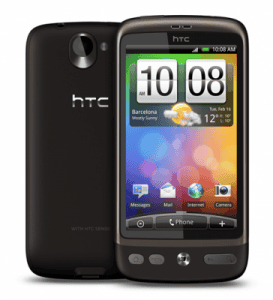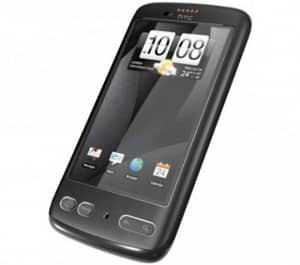The HTC Desire has been hailed as an iPhone killer, but can it also be a BlackBerry killer in the enterprise?
A number of HTC Desire reviews don't look into this, but we think there's a case for replacing your laptop with this handset.
So here are our top five reasons why this ambitious Android is a smartphone for business.
5. Big Screen
One of the first things you notice about the Desire is just how sizey its screen is. At 3.7 inches it's bigger than the 3.5 inch screen on the iPhone and also larger than the screen on BlackBerry's Storm 2 touchscreen phone.
Its OLED technology allows you to view images when looking at it from different angles and makes surfing the internet an absolute joy with the rich colours displayed.
4. HTC Sense
While the phone is powered by Android 2.1, HTC's Sense user interface is what you see on the surface, and in a word it's brilliant. Widget placing is easily customisable among the 7 homescreens, so you can keep apps that you use all the time right on the face of your phone.
HTC Sense will also let you analyse emails according to sender, date and favourites, which makes for fast searching when you need that email up while you're on the phone. You can also make use of Friendstream which gathers your various social networking profiles together in the one place. Don't say you don't use Facebook at work"¦
3. Speed
The latest iPhone on the market may have an "s" for speed after its name, and we think the Desire is worthy of the same badge thanks to the Quacomm Snapdragon chip powering it along.
Whether you're browsing online, waiting for that critical email from the boss, or planning a route with GPS, the Desire handles all of this faster than you can say "Android".
2. Android Business Apps
The Android marketplace now has over 20,000 apps, and being completely open source, you get a real sense of the creativity out there in creating new apps to serve functions you haven't even thought of yet.
The business category within the Marketplace comprises a large amount enterprise apps, including Documents to Go which lets you view and edit Word, Excel and PowerPoint files, as well as Scan2PDF which uses the phone's camera to convert a snapshot into a .pdf file.
1. Native Support For Exchange Mail
The number one reason we need a smartphone for business is to keep tabs on our emails. Being an Android phone, the Desire comes with a built-in app for Gmail, but most of us use Outlook in the office.
Going one up on the Google nexus one, the HTC Desire comes with native support for Exchange mail, calendar and contacts, so you have access to everything you would have while sitting at your desk in the office.
We Say
The Desire is fast establishing itself as a handset for the pub, but there is definite room for it on your desk. It has productivity tools, robust email and comes with all the connectivity you need to get through a work day out of the office.
With a range of mobile phone deals around, we're sure you can convince the finance team to fund this business purchase for you!



4 thoughts on “HTC Desire: 5 Reasons Why it is a Smartphone for Businesses”
I agree it’s a nice piece of kit for the end user, but you don’t address the to major pain points for enterprise level organizations.
How do we protect sensitive information stored in or accessed from easily misplaced or stolen devices? There’s no credible device encryption for Android phones as yet.
How do we manage and provision a large number of devices with company specific data and applications (not least access credentials)? The Android Market isn’t enough, even if it were rolled out globally.
Hi Bertil,
Agreed that many companies still have security issues with Android and iPhones, but more and more employees are using their own personal phones for work.
This article is pointing out how Android has made enterprise functionalities possible on the HTC Desire, although you’re right in that there is still some way to go before Android encryption reaches the levels of BlackBerry.
Can you doenload pdf or word documents from your emails and store them on the phone?
Agreed that many companies still have security issues with Android and iPhones, but more and more employees are using their own personal phones for work.